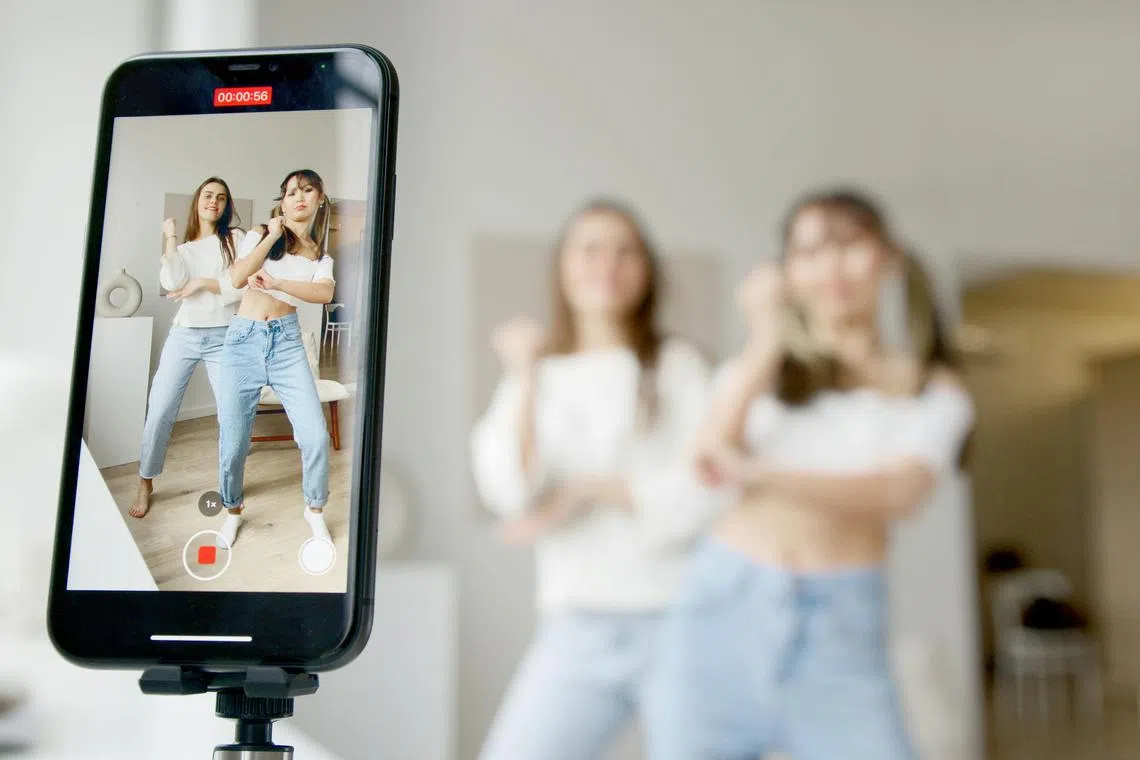‘Serious business’: Influencer degree launches in Ireland
Sign up now: Get ST's newsletters delivered to your inbox

Surveys show that most people in Gen Z – those born between 1997 and 2012 – would consider a job as a vlogger, YouTuber or professional streamer.
PHOTO ILLUSTRATION: PEXELS
CARLOW – It is a job that did not exist until recently, but becoming an influencer is an increasingly popular career path among Gen Z youth in the modern era of social media. Now, a first-of-its-kind course at an Irish university is teaching wannabe influencers how to convert online presence and content on platforms such as Instagram, TikTok and YouTube into revenue streams.
“Influencing is something that’s catching fire,” said course director Irene McCormick at South East Technological University in Carlow, an hour’s drive south-west from the capital Dublin.
The idea grew out of a summer crash course, Digital Hustle, launched by Dr McCormick that was taught by TikTokers and attracted 350 applicants for 30 places.
“It got amazing traction, we could see the appetite for more, so we broadened it to degree level,” said Dr McCormick, a former television producer and director.
After two years of development, the course – a four-year bachelor’s degree in content creation and social media – received accreditation and welcomed its first intake of 15 students in September.
On the state-of-the-art campus, students chatted, took selfies and scrolled their social media feeds on smartphones during a break between classes.
“My friends tell me I talk a lot, so I thought I might as well make money out of it and try this course,” said Mr Harry Odife, 22, at the campus TV studio during a roleplay exercise.
Most of the students are already immersed in the digital space or working in it and want to expand their toolset and knowledge, Dr McCormick said.
“You can try to learn yourself at home, but being empowered with practice and theory about how to connect with target demographics online is going to make a big difference to your career,” she added.
The term “influencer” was officially added to the dictionary in 2019, and refers to a person well-known through use of social media who uses his or her celebrity to endorse, promote or generate interest in products and brands, often for payment.
The most prominent, such as YouTube challenge stunt creator Mr Beast and gaming vlogger KSI, tap vast online audiences, earning huge sums for each sponsored post or via brand sponsorships and advertisements.
Surveys consistently show that most people in Gen Z – those born between 1997 and 2012 – would consider a job as a vlogger, YouTuber or professional streamer.
“Of course, people want to make money from influencing, so we look particularly at person branding, how to monetise being influential over large online followings,” said Dr McCormick.
Students said they hoped the course would help them leverage their interests and hobbies, which range from beauty and fashion to entertainment and social justice.
“I post a lot of the hairstyles I do on TikTok and Instagram. It would be nice to have the knowledge to grow that into an actual business,” said hairdresser Favour Ehuchie, 18.
Another student, keen equestrian Marta Hughes Bravo, said horse stud farms now seek staff who are social media-savvy. “Companies are all over Instagram, Facebook and TikTok. One girl who works for a farm has been pulling in brand deals. To know how to do that would be fantastic,” she said.
Degree modules include creative video and storytelling psychology, entrepreneurship, celebrity studies, data analytics and podcasting.
“A lot of people think it’s an easy life being an influencer, just posting 60-second videos on TikTok, but there is way more to it,” said Ms Hughes Bravo.
Creating content involves “editing, planning, organising and so on, it takes up more time than you might think, people don’t understand that quite yet”.
Practical elements of the course include camera and microphone learning, and work placements.
“Having influencer knowledge like how to be comfortable in front of cameras will help us build our confidence, whatever we end up doing,” said student Naoise Kelly, adding that becoming the next big thing on social media is not her top priority.
Dr McCormick said employment opportunities for influencer talent are multiplying exponentially, either in front of the camera or behind the scenes. “Yes, influencer posts on social media may sometimes be frivolous, but the actual business is not, it is a very serious business,” she added. “So many young people buy a lot of bling, and that bling is being sold through influencers.
“Around 70 per cent of marketeers now believe in influencers as the future of marketing. Governments are also using them to message people. That’s how we access markets now.” AFP


